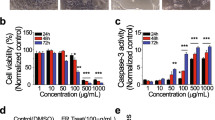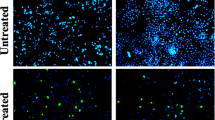Abstract
Ovarian cancer is the malignant tumour of the female reproductive organ with highest mortality rate among all the types of gynaecological tumours. This study investigated the effect of Dioscorea deltoidea leaf extract (DDLE) on OV-90 and CAOV4 ovarian cancer cells. The results demonstrated that DDLE suppresses OV-90 and CAOV3 cell viability significantly in dose dependent manner. The OV-90 and CAOV3 cell viability were reduced to 24 and 27% respectively with 20 mg/mL DDLE treatment. Five mg/mL DDLE treatment of OV-90 and CAOV4 cells raised percentage of cells in G2-phase to 55.9 and 51.2%, respectively. In 5 mg/mL DDLE -treated OV-90 and CAOV4 cells a prominent suppression in cyclin-D1 and cyclin B1 proteins was observed in 48 h. The DDLE treatment promoted OV-90 and CAOV3 cell apoptosis to 34.65 and 29.89%, respectively. The Fas, FasL, cleaved caspase-3, and Bax levels were up-regulated markedly in the cells after DDLE treatment. Moreover, DDLE treatment suppressed p-mTOR, p-AKT and p-PI3K expression in OV-90 and CAOV3 cells. Thus, DDLE suppressed ovary cancer cell viability and elevated cell apoptosis. Inhibitory effect of DDLE on ovarian cancer cells is associated with targeting PI3K/AKT/mTOR pathway.






Similar content being viewed by others
REFERENCES
Jemal, A., Siegel, R., Xu, J., and Ward, E., Cancer statistics, 2010, Cancer J. Clin., 2010, vol. 60, no. 5, pp. 277–300.
Scholz, H.S., Tasdemir, H., Hunlich, T., et al., Multivisceral cytoreductive surgery in FIGO stages IIIC and IV epithelial ovarian cancer: results and 5-year follow-up, Gynecol. Oncol., 2007, vol. 106, no. 3, pp. 591–595.
Hamilton, C.A., Miller, A., Miller, C., et al., The impact of disease distribution on survival in patients with stage III epithelial ovarian cancer cytoreduced to microscopic residual: a Gynecologic Oncology Group study, Gynecol. Oncol., 2011, vol. 122, no. 3, pp. 521–526.
Osley, M.A., The regulation of histone synthesis in the cell cycle, Annu. Rev. Biochem., 1991, vol. 60, pp. 827–861.
Hu, T., Fei, Z., and Wei, N., Chemosensitive effects of astragaloside IV in osteosarcoma cells via induction of apoptosis and regulation of caspase-dependent Fas/FasL signalling, Pharmacol. Rep., 2017, vol. 69, no. 6, pp. 1159–1164.
Zhao, Y., Sun, H., Feng, M., et al., Metformin is associated with reduced cell proliferation in human endometrial cancer by inbibiting PI3K/AKT/mTOR signalling, Gynecol. Endocrinol., 2018, vol. 34, no. 5, pp. 428–432.
Hill, M.M. and Hemmings, B.A., Inhibition of protein kinase B/Akt. Implications for cancer therapy, Pharmacol. Ther., 2002, vol. 93, nos. 2–3, pp. 243–251.
Liu, J., Li, H.Q., Zhou, F.X., et al., Targeting the mTOR pathway in breast cancer, Tumour Biol., 2017, vol. 39, no. 6. 1010428317710825.
Kumar, S., Das, G., Shin, H.S., and Patra, J.K., Dioscorea spp. (a wild edible tuber): a study on its ethnopharmacological potential and traditional use by the local people of Similipal Biosphere Reserve, India, Front. Pharmacol., 2017, vol. 8, p. 52.
Fan, W., Sun, L., Zhou, J.Q., et al., Marsdenia tenacissima extract induces G0/G1 cell cycle arrest in human esophageal carcinoma cells by inhibiting mitogen-activated protein kinase (MAPK) signaling pathway, Chin. J. Nat. Med., 2015, vol. 13, no. 6, pp. 428–437.
Xue, H.L., Huang, X.D., He, D., et al., Effects of Marsdenia tenacissima extract on proliferation and apoptosis of hematologic neoplasm cell line cells, Sichuan Da Xue Xue Bao Yi Xue Ban, 2012, vol. 43, no. 2, pp. 174–179.
Cai, L., Li, H., Chen, C., et al., Role of inhibitor of growth 4 in the suppression of human melanoma cells through the Fas/FasL-mediated apoptosis pathway, Int. J. Mol. Med., 2018, vol. 41, no. 2, pp. 1055–1061.
Liu, T., Wei, J., Jiang, C., et al., CHAF1A, the largest subunit of the chromatin assembly factor 1 complex, regulates the growth of H1299 human non-small cell lung cancer cells by inducing G0/G1 cell cycle arrest, Exp. Ther. Med., 2017, vol. 14, no. 5, pp. 4681–4686.
Bhola, P.D. and Letai, A., Mitochondria-judges and executioners of cell death sentences, Mol. Cell, 2016, vol. 61, no. 5, pp. 695–704.
Liu, X., He, Y., Li, F., et al., Caspase-3 promotes genetic instability and carcinogenesis, Mol. Cell, 2015, vol. 58, no. 2, pp. 284–296.
Nagata, S. and Golstein, P., The Fas death factor, Science, 1995, vol. 267, no. 5203, pp. 1449–1456.
Funding
This research was funded by First-Class Discipline Construction Founded Project of Ning**a Medical University and the School of Clinical Medicine (grant no. NXYLXK2017A05).
Author information
Authors and Affiliations
Corresponding author
Ethics declarations
The authors declare that they have no conflict of interest. This article does not contain any studies involving animals or human participants performed by any of the authors.
AUTHOR CONTRIBUTIONS
Ying Jiao and Ying **ong are co-first authors of the article.
Rights and permissions
About this article
Cite this article
Jiao, Y., **ong, Y., He, L. et al. Dioscorea deltoidea Leaf Extract (DDLE) Targets PI3K/AKT/mTOR Pathway and Inhibits Ovarian Cancer Cell Growth. Dokl Biochem Biophys 497, 144–150 (2021). https://doi.org/10.1134/S1607672921020058
Received:
Revised:
Accepted:
Published:
Issue Date:
DOI: https://doi.org/10.1134/S1607672921020058




